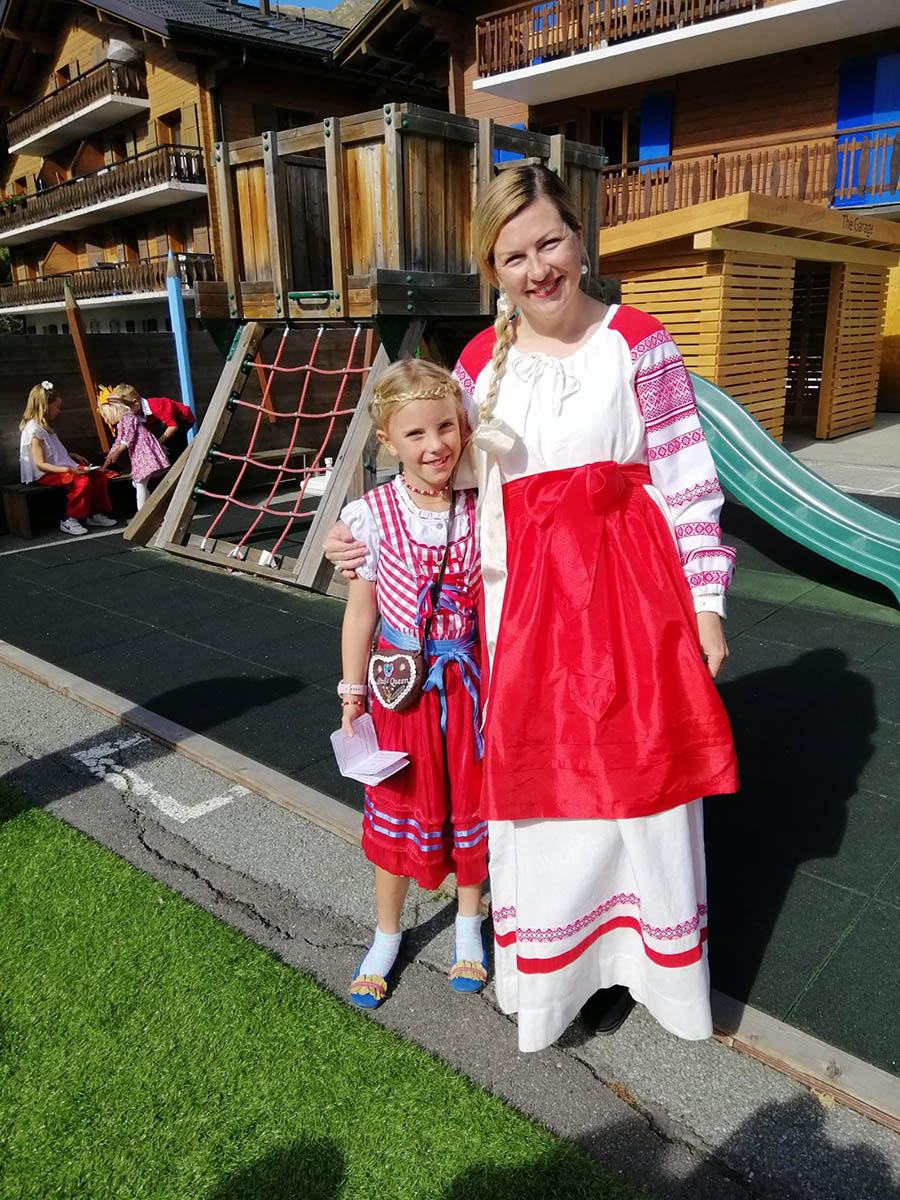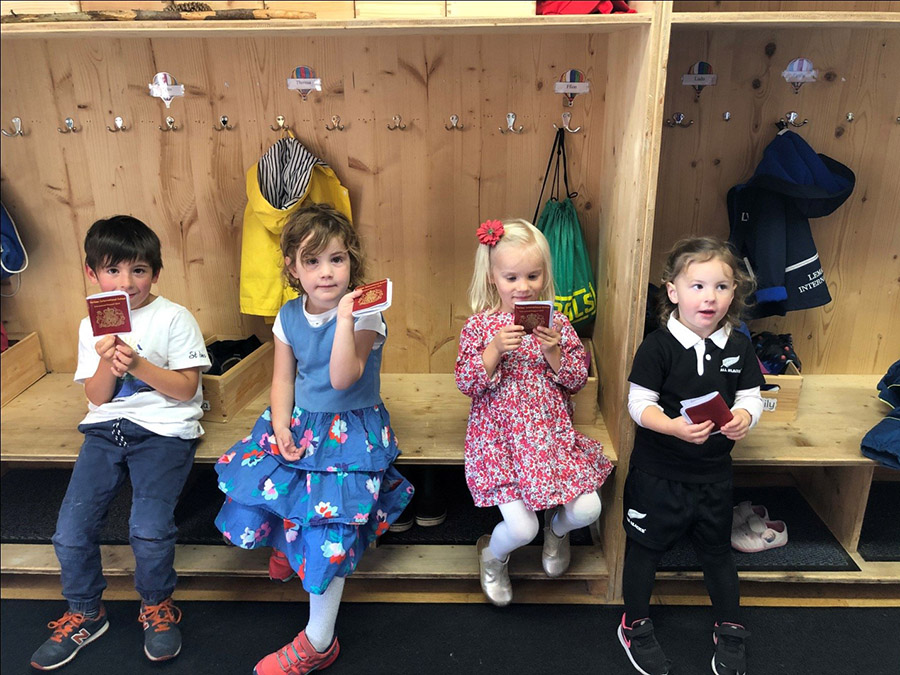INTERNATIONAL DAY 2019

International Day provides a chance to make learning more fun and uniting all the nationalities in LVIS. The annual International Day was commemorated on Friday 11th October at the school. Greetings from various countries around the globe such as: “Hola! Hej! Bonjour! Privet! Hello! Halo! Ahoj!” filled the air.
Celebrating cultures, traditions, and different countries during International Day teaches children the art of embracing and respecting international colleagues. There are approximately 14 nationalities in LVIS, bringing out tremendous diversity among the students and staff. Both parents and pupils from various countries get an opportunity to share traditions and culture.
The event provided an ideal opportunity for us to sample different countries while still in Verbier. These are; the Czech Republic, Australia, USA, Russia, Denmark, Sweden, Costa Rica, Germany, United Kingdom, France, New Zealand, and Belgium. There were different activities which were classified depending on the children’s specific needs and their age groups. These activities include;
SAYING HELLO
According to the world language encyclopedia, approximately 7,000 languages were spoken across the world in 2005. Attempting to learn differently was one of the activities that both the students and staff engaged in. every child practiced saying hello in as many languages as they could. The younger classes were tasked with writing hello in various languages on the board. The rest of the students would then guess the language each different word was written in.
PASSPORTS

Many students found this activity to be so much fun. There were different activity stations around the room, each of which represented different countries. There were both educational activities while some included games. Each participant was given a dummy passport from a different country.
They later took instant photos and placed them inside the passports. Some of the art children preferred drawing their pictures on paper which they inserted in between their passports. They later stamped them with the country’s name.
INTERNATIONAL GAMES
Different countries have different games which both adults and children can play. The students interacted with one another and learned different games from one another. The games were categorized according to the children’s age. Some of the games included; the Alto Ahi Argentinian game, a sports-oriented game which is ideal during warm weather. One student, also known as “it” stood in the middle.
The other participants counted to three before running away. The student, (it) would then throw a ball in the air. As it bounced back and he caught it, he would shout, “stop there” before naming one of their colleagues. The student who had been called (thrower) then froze as the “it” threw him the ball.
The rest of the participants had to run away from the thrower. Once the thrower catches the ball, he would shout “stop there” and all the other students froze. The thrower proceeded to take three steps towards one person before throwing the ball and tagging him or her. That person was then supposed to get one letter from the word Alto.
When he or she missed, he would be given one letter. The student who got all the four letters became “it” in the subsequent round. The rules of the game were: students were supposed to use a softball and avoid aiming at each other’s faces.
SAMPLING DELICIOUS FOOD

International Day wouldn’t be complete without a variety of delicious meals from different parts of the world. During this year’s event, parents came in large numbers with different local meals from different parts of the world.
We appreciate all the parents who made our parents stall at the school a hive of activity. There was a wide range of sumptuous flavors and smells. There were exciting facts about the meals and both students and staff learned a lot.
At one stall you could see students happily munching on tasty freshly cooked Pommes Frites, a Belgian delicacy. Traditional pies from the UK and the USA were also popular among the students. Olivier, the Russian salad, sweet cakes from Germany and Swedish sweets were also available. The children couldn’t hide their joy and excitement for having the opportunity to sample a vast range of cuisine.
At the Denmark stall, students were happy to engage in building LEGO. They also had a taste at a traditional dessert. Children at the Czech Republic children tasted traditional meals and drew the country’s national flag.
At the New Zealand stall, students engaged in traditional painting and learned more about animals found in the country. At the Costa Rica stall, students learned about the country’s beautiful costumes and the local fruits. Students visiting Russia stall made a Russian doll also known as matryoshka and had their names scribbled in Cyrillic alphabet.
BENEFITS OF ATTENDING AN INTERNATIONAL SCHOOL
One of the main areas where many parents prioritize is selecting a good school for their children. It’s worth noting that educational institutions utilize varying teaching curriculum and approaches. These can have an impact on a child’s lifelong learning process.
This explains why many parents admit to feeling overwhelmed when it comes to choosing a school among many options. While each educational facility comes with varying advantages, international schools have been praised for giving children a unique edge. Here are some of the benefits of taking your child to an international school.
They get Exposed to New Cultures

Many international schools follow the international curriculum which integrates diverse cultures in the learning process. The curriculum used in international schools is internationally accepted. During their learning days, children will understand different cultures from across the world and learn how to appreciate them.
In the process, they will have an easy time interacting and collaborating with people from different parts of the world. Further, the children will explore the similarities and differences in various cultures as compared to their own culture. When your child attends an international school, they become more confident and insightful.
This way, they will have no problem dealing with other people in the future. Studies established that students in international schools had a better time appreciating the world than students from traditional schools.
Development of Personality
Many international schools celebrate the differences in student personalities and culture. Many times this act comes in handy to instill an emotional maturity in the children. In the process, the child interacts with other students from other countries and makes lifelong friendships. International students navigate through daily challenges such as languages better. They can also live alone, an act which instills in them a sense of independence.
Engaging in more Extracurricular Activities
International schools include extracurricular activities in their curriculum designed to help children develop new skills. For example, students can learn how to be creative by engaging in extracurricular activities such as robotics and math leagues. Debates and destination imagination are also essential when it comes to nurturing creativity in children.
Once the children succeed in new activities, they become more confident and desire to nurture their new talents. Children who engage in extracurricular activities are less susceptible to behavior problems. Extracurricular activities are an ideal opportunity for children to learn how to collaborate with other children. What’s more, the children will develop critical thinking and problem-solving skills.
Expand their Career Opportunities
As the world becomes a global village, many businesses are operating on an international scale. Employers are searching for individuals who have interacted with people from different cultures. Studies indicate that such people are more effective when working with people from different places in the world.
Many students attending international schools learn more than one language with some employers recognizing multilingualism as an essential trait. Bilingual students will execute international based business tasks with minimal tasks. As we’ve seen above, children learning in international schools are more confident and this is displayed in their careers.
WHAT ARE THE BENEFITS OF SPEAKING DIFFERENT LANGUAGES?
There are numerous benefits of speaking more than one language. First, learning multiple languages not only challenges the brain, but it also enhances learning, social-emotional, and cognitive development. It also increases the chances of excelling in life. The benefits of speaking multiple languages include:
- Being more flexible in solving problems
- Qualifying for more job opportunities
- Building diverse friendships
- Developing robust thinking skills
FINALLY
This year’s International Day was successful. Teachers, students, and parents had a chance to gather, celebrate together, and sample our student body’s diverse cultural backgrounds. Some of the activities that stood out this year include: participating in traditions and customs and learning a new language. Sampling activities from various parts of the world and learning about other countries were among the highlights of the day. Tasting the delicious cuisine was one of the activities the students enjoyed most. “Thank you, tak, Merci, Danke, spasiba, gracias, tack, děkuji” to all families and teachers. We can’t wait for next year.






